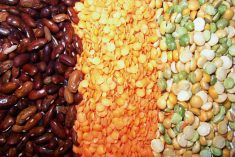Moscow | Reuters — Russia’s grain crop will suffer if rains do not come this week as expected to several growing regions of the country, one of the world’s main wheat exporters via the Black Sea, analysts said on Monday.
The agriculture ministry forecast the 2014 crop at 100 million tonnes on Thursday, its most optimistic estimate so far and up from 95 million tonnes, but gave no reason for the move.
“If there is no rain this week, some optimistic forecasts would have to be downgraded,” Dmitry Rylko, the head of the Institute for Agricultural Market Studies (IKAR), said.
Read Also

Dryness poised to threaten Saskatchewan crops
Crops in Saskatchewan are developing in opposite directions, the province’s latest crop report said. Growing conditions in the province vary, with some areas receiving enough rain while other locations are experiencing crop stress due to hot, dry conditions.
IKAR, the Moscow-based agricultural consultancy, had kept its 2014 forecast at 94.5 million tonnes, Rylko said. Another leading Russian consultancy, SovEcon, said it was also keeping its 2014 grain crop estimate unchanged at 90 million tonnes.
Rain is needed in the Central and Volga Federal districts, analysts said, but one trader said those districts had enough moisture in the soil for this week and next thanks to rain in early May.
“Conditions are not critical yet and if rains come to the Centre (the Central district) this week as expected the situation can be fixed quickly,” SovEcon head Andrey Sizov said.
However, conditions remained favourable overall in the main wheat growing and exporting region — the Southern Federal district, analysts and the trader said, noting that thanks to this futures prices for the new wheat crop continue to fall.
Russian futures prices for the new wheat crop with 12.5 per cent protein content were quoted at US$263 per tonne at the end of last week, down from $265 per tonne a week earlier on a free-on-board (FOB) basis in the Black Sea, IKAR said.
As for the old crop, prices have fallen US$5, to $281 per tonne, in the Black Sea, IKAR said. Wheat harvesting in Russia’s South is expected to start around June 25. New crop barley is quoted at US$228 per tonne.
Farmers had sown 24.4 million hectares as of May 23, or 76.5 per cent of the whole planned area for spring grains, which was 3.7 million hectares more than on the same day a year ago, according to data from the Agriculture Ministry.
Spring wheat was sown on 9.3 million hectares, or 70.6 per cent of the whole planned area, and 2.7 million hectares more than a year ago.
SovEcon estimated that Russian sunflower seed prices rose by 125 roubles to 13,375 roubles (US$390) a tonne at the end of last week. IKAR pegged it at 13,600 roubles a tonne, down 100 roubles.
Export prices for sunflower oil were flat at US$870-$880 a tonne on a FOB basis in the Black Sea, according to SovEcon. IKAR’s crude sunflower oil price index was quoted at US$841 per tonne, down $3.
The white sugar price index in Russia’s south was up 700 roubles at 29,300 roubles (US$860) a tonne last week, IKAR said.
— Reporting for Reuters by Polina Devitt in Moscow.



















